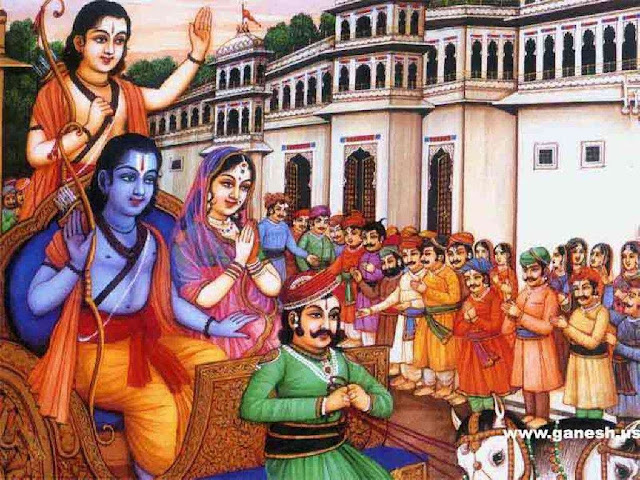कैकेयी / मँथरा : पारस- स्पर्श : लेख मालिका
दोहा: भरत सरिस को राम सनेही,
जग जपे राम, राम जपे जेहि
सुमति कुमति सब के उर सही,
नाथ पुराण निगम अस कहीँ
जहाँ समति तहँ सँपत्ति नाना,
जहाँ कुमति तहँ विपत्ति निदाना
आज अयोध्यापुरी, इन्द्र की अलकापुरी को मात कर रही है। राजमहल के सिँहद्वार पर मँगलवाध्य बज रहे हैँ फूल तोरण से हर प्रासाद शोभायमान है।
भरत लाल ने नँदीग्राम से सँदेशा भिजवाया है कि, " श्री राम, माँ जानकी समेत, लखन लाल के संग अयोध्या पुरी पधार रहे हैँ। मेरे बडे भैया लौट आयेँगे "
इतने विचार से , भरतजी के साथ हर अयोध्यावासी के मानोँ भाग्य के सूर्य का उदय हो रहा है। पिता की आज्ञा का पालन करते हुए, जन जन के दुख का हरण कर, आज्ञाकारी श्री रामने १४ वर्ष बनवास भोगा। दुःख का काल समाप्त हुआ।आज सुमँगल अवसर आया है। मानोँ मृत शरीर मेँ प्राण लौट आये हैँ!
अयोध्यापुरी में हर्ष का पारावार उमडा है।
कैकेयी महारानी के प्रासाद से लगे एक कक्ष मेँ, मैले कुचले वस्त्र पहने एक वृध्धा, अपने रुखे, अस्त व्यस्त बिखरे केशोँ को, बार बार सहला रही है। परछाईँ के बीचसे, झाँकते उसके विस्फरीत नेत्र , टकटकी बाँधे द्वार को देख रहे हैँ ! कौन है ये अमँगला रुप लिये स्त्री ? जो अयोध्या नगरी के मँगल उत्सव के विपरीत दीख रही है ?
ये है कैकेयी रानी की मुँहलगी , दासी मँथरा ! मँथरा का मतलब है = दुर्बुध्धि ! मँथरा अयोध्या की नागरिक नहीँ थीँ परँतु, कैकेयी के साथ कैकय देश से आई थी।
मँथरा का मतलब है = दुर्बुध्धि ! मँथरा अयोध्या की नागरिक नहीँ थीँ परँतु, कैकेयी के साथ कैकय देश से आई थी।
 मँथरा का मतलब है = दुर्बुध्धि ! मँथरा अयोध्या की नागरिक नहीँ थीँ परँतु, कैकेयी के साथ कैकय देश से आई थी।
मँथरा का मतलब है = दुर्बुध्धि ! मँथरा अयोध्या की नागरिक नहीँ थीँ परँतु, कैकेयी के साथ कैकय देश से आई थी।
ब्रह्माजी के कहने पर, माँ सरस्वती ने, मँथरा की मति फेर दी थी। अयोग्य व्यक्ति की मति कु -समय पर, अक्सर, बदल जाती है। मँथरा लोभी, दँभी व पाँखँडी थी। उसीने कैकेयी के कान भरे थे और उकसाया था कि, वह, महाराज दशरथ से, उनके एकमात्र पुत्र भरत लाल के लिये राजगद्दी माँग ले और श्री राम को वनवास दे दीया जाये !
कैकेयी भी कुबुध्धि के वश हो गईँ। महाराज दशरथ ने उन्हेँ २ वचन माँगने को कहा था जब एक बार , युध्ध भूमि पर कैकेयी ने महाराज की प्राण रक्षा की थी अपने कुशल रथ सँचालन से मूर्छित दशरथजी को वे, शत्रु पक्ष से बचा, सुरक्षित स्थान पर ले गईँ थीँ। जब होश आया तब महाराज दशरथ ने उन्हेँ २ वचन माँगने को कहा था।उस समय तो कैकेयी ने कुछ माँगा नहीँ था।
कई वर्षोँ पश्चात, भरत के लिये, अयोध्या का राज ~ सिँहासन और राम को वनवास ! यह दो वचन मँथरा के उकसाने पर कैकेयी ने माँगे !
अयोध्या नरेश दशरथ जी ने कहा, " रघुकुल रीति सदा चली आई, प्राण जायेँ वरु, वचन न जाई " जब श्री राम, चल निकले, तब दशरथ जी के प्राण पँखेरु उड गए ! माता कौशल्या, माता सुमित्रा को पुत्र वियोग सहना पडा। लक्ष्मण जी भी बडे भाई राम जी व भाभी सीता जी की सेवा करने वन गए। उर्मिला जी बिन कारण वियोगिनी बनीँ ! माँडवी , श्रुतकीर्ति, भरत लाल व शत्रुघ्नजी सभी की सेवा करने मेँ दुखी मन से समय बिताने लगे।
श्री राम वन गए तभी तो असँख्य मात्रा मेँ राक्षस दल का सँहार हुआ। पापी रावण की महासत्ता का नाश हुआ।विभीषण को लँका का राज्य मिला। अनेक ऋषियोँ को आश्रम मेँ श्री राम, सीता जी के दर्शन हुए।
१४ वर्ष तक भरत जी तपस्वी बन कर श्री राम की चरण पादुका को सिँहासनारुढ कर, श्री राम नाम से राज्य का भरण पोषण करते रहे थे।
आज पुष्पक विमान से उतर कर श्री राम, सीधे कैकेयी माता के कक्ष की ओर चल पडे। मँथरा ने देखा तो वह चिल्लाती हुई आयी , " प्रभु ! मुझ पापिन को कदापि क्षमा ना करेँ !! प्रभु, दँड दीजिये! मैँने घोर अपराध किया है ! मैं पापिन हूँ ! मैँ, ही सर्वनाश का कारण हूँ ! "
श्री राम: " हे,माता ! पश्चात्ताप की अग्नि से जलकर आप पवित्र हुई ! उठो माँ ! मुझे औरा लक्ष्मण को आशीर्वाद दो ! देखो, जानकी आपकी चरण वँदना कर रही है , मेरे भरत को आशिष दो माँ ! " पैरोँ पर रोती गिडगिडाती, मँथरा को प्रभु ने अपने कोमल करोँ से उठा लिया। मन्थरा को आसन पर बिठलाया, शीतल जल पिलाया। प्रभु के पावन चरण स्पर्श कर, मँथरा पावन हुई। उसकी दुखी आत्मा को पवित्रता मिली ! दुखी कैकेयी माता के पाप भी धुल गए। पारस - स्पर्श से विकृत लोहा भी पवित्र स्वर्ण हुआ प्रभु कृपा का यही स्वरुप है ! यही प्रसाद है।
" सब जानत प्रभु, प्रभुता सोई, तदपि कहे बिनु रहा न कोई
~ लावण्या




